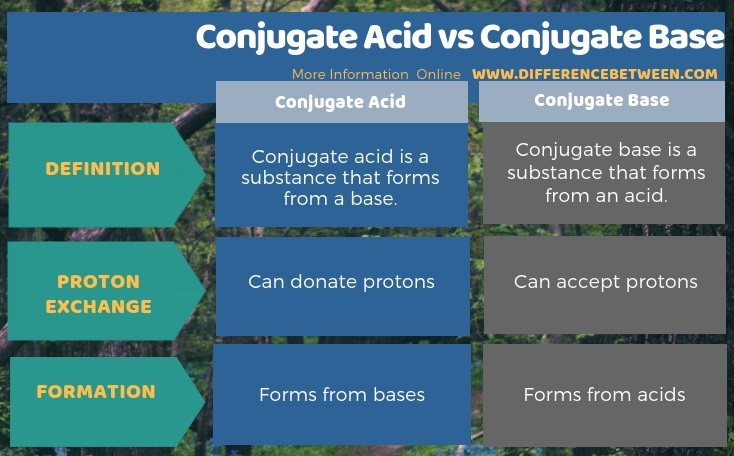The key difference between conjugate acid and conjugate base is that conjugate acids donate protons, whereas conjugate bases accept protons.
In 1923, two scientists, Bronsted and Lowry presented a theory on acid-base behaviour. According to Bronsted – Lowry theory, an acid is a proton donor, and a base is a proton acceptor. Therefore, a molecule to behave as an acid should encounter a proton acceptor. On the other hand, a molecule to behave as a base it should encounter a proton donor. Therefore, for an acid-base reaction, both proton donors and acceptors should be there. However, water can act as both acid and base. When water accepts a proton, it forms a hydronium ion, and when it donates a proton, it produces a hydroxide ion.
CONTENTS
1. Overview and Key Difference
2. What is Conjugate Acid
3. What is Conjugate Base
4. Side by Side Comparison – Conjugate Acid vs Conjugate Base in Tabular Form
5. Summary
What is Conjugate Acid?
Conjugate acid is a substance made from a base. When a base accepts a proton from another molecule, it forms a conjugate acid. Conjugate acid can remove the electron and return to the parent base. Thus, conjugate acids have acidic properties.

Figure 01: Formation of Conjugate Acid and Conjugate Base
For example, we can consider the situation where ammonia dissolves in water.
NH3+ H2O ⇌ NH4+ + OH–
In the above example, ammonium ion is the conjugate acid of ammonia. Likewise, when considering the backward reaction, water is the conjugate acid of hydroxide base.
What is Conjugate Base?
Conjugate base is a substance that forms after an acid gives up a proton to a base. But, this can accept a proton again; thus, it has basic characteristics. The potential proton acceptor formed from the parent acid is the conjugate base. When the conjugate base accepts a proton, it is reverse to the parent acid again.
Besides, many solvents can act as proton donors or acceptors. Therefore, they can induce the acidic or basic behaviour in solutes. For example, when ammonia dissolves in water, water acts as the acid and gives a proton to ammonia, and thus, forming an ammonium ion. Meanwhile, the water molecule is converted to a hydroxide anion. Here, the conjugate base of the water is the hydroxide anion. And the conjugate base of the ammonium is ammonia.
What is the Difference Between Conjugate Acid and Conjugate Base?
The key difference between conjugate acid and conjugate base is that conjugate acids can donate protons, whereas conjugate bases can accept protons. Moreover, conjugate acids are formed from bases; conversely, conjugate bases are formed from acids. However, the conjugate acids and bases that form in a spontaneous reaction are much weaker than their parent molecules.

Summary – Conjugate Acid vs Conjugate Base
Conjugate acid and conjugate base are a pair of chemical species that has opposite chemical behaviour. The key difference between conjugate acid and conjugate base is that conjugate acids can donate protons, whereas conjugate bases can accept protons.
Reference:
1. Libretexts. “11.12: Conjugate Acid-Base Pairs.” Chemistry LibreTexts, National Science Foundation, 26 Nov. 2018. Available here
Image Courtesy:
1.”Conjugate base reaction”By Schlenk (CC BY-SA 3.0) via Commons Wikimedia
ncG1vNJzZmivp6x7pbXFn5yrnZ6YsqOx07CcnqZemLyue8OinZ%2Bdopq7pLGMm5ytr5Wau26vzqehrp%2BRqbJurcKim2aZnpl6t7%2BMnKanoqWcrrWxjJuYrJ1f